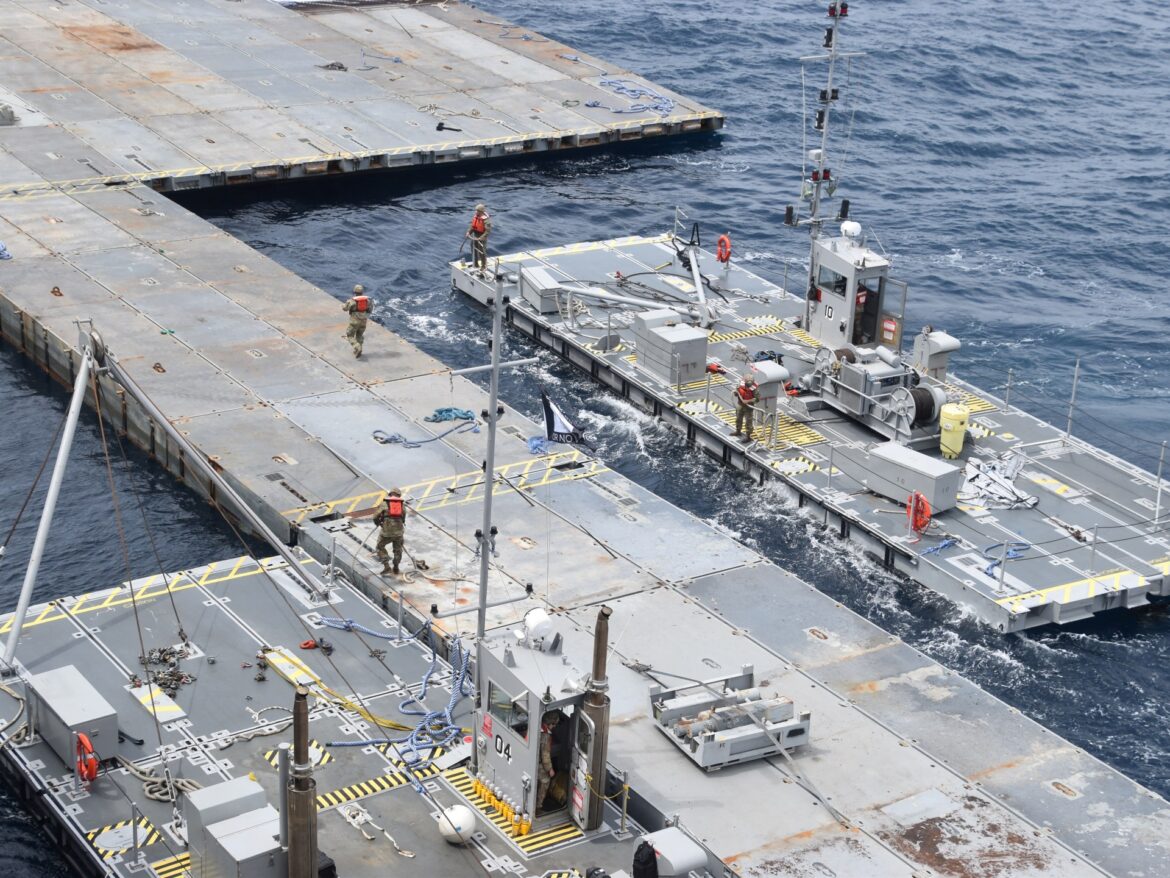Anadolu Agency reported that dozens of trucks loaded with humanitarian aid arrived – yesterday evening, Friday – at United Nations warehouses in the city of Deir al-Balah in central Gaza, after the first aid ship unloaded from the floating dock on the shores of the besieged Strip.
Trucks carrying aid arrived at the warehouses of the United Nations World Food Programme, but it was not clear when this aid would be distributed to the residents of the Gaza Strip who are suffering from difficult humanitarian conditions as a result of the Israeli war.
Earlier yesterday, dozens of trucks set off from areas south of the Strip and arrived at the floating dock south of Gaza City, and began transporting the cargo of the first humanitarian aid ship, according to Anadolu.
Local Palestinian sources reported that the trucks would transport the aid ship’s cargo to areas south of the Gaza Strip to distribute it to hundreds of thousands of displaced people, especially the Al-Mawasi area, west of Khan Yunis and Deir Al-Balah.
The US Central Command (Centcom) announced on Friday that the first humanitarian aid trucks had begun moving across the floating dock into the Gaza Strip.
The statement explained that this operation comes as part of ongoing efforts by a number of nationalities to provide additional aid to Palestinian civilians in Gaza through the sea corridor of a “fully humanitarian nature,” which includes aid from some countries and humanitarian organizations.
The Palestinians in Gaza suffer from a severe scarcity of all basic materials, causing famine and disastrous conditions as a result of the ongoing war waged by Israel against the Palestinian Strip.
British aid truck
The first shipment of British aid successfully arrived on the Gaza coast yesterday, via the temporary maritime platform established by the United States.
The first shipment includes 8,400 plastic shelter covers, along with aid from the United States and the UAE. It is the first batch of British aid that arrived via the sea corridor from Cyprus, after being inspected at the port of Larnaca.
More British aid is expected to arrive in the coming weeks, which will include 2,000 blankets, 900 tents, 5 forklifts, and 9,200 personal hygiene supplies.
In turn, British Prime Minister Rishi Sunak praised the “tremendous” international efforts that resulted in the arrival of this aid, and the role of the British Armed Forces and their partners in delivering this much-needed support.
Sunak stressed the importance of continuing the flow of aid via sea routes, stressing the need to open more land routes, including the Rafah crossing, to ensure that aid reaches larger quantities and in a safe manner to civilians in need in Gaza.
Sea aid is insufficient
The Associated Press quoted American military officials as saying they expected about 150 aid trucks to cross the floating dock daily into the Gaza Strip.
However, humanitarian workers confirmed that the aid coming by sea will not be enough to alleviate the severe human suffering in Gaza, noting that the most effective method is to deliver it through land crossings.
In a related context, eyewitnesses and Palestinian security sources reported that 55 commercial trucks loaded with goods for the private sector entered from Israel through the Kerem Shalom commercial crossing.
These sources explained that the trucks did not carry any aid, but rather goods belonging to Palestinian merchants in Gaza.
Since the Israeli army took control of the Palestinian side of the Rafah crossing on May 7, the main corridor for the entry of aid, and closed the Kerem Shalom crossing on the fifth of the same month, no humanitarian aid truck has entered Gaza, which made the situation more disastrous and sparked international criticism. Sharp for Israel.
On May 15, Israel allowed 52 private sector commercial trucks to enter Rafah, for the first time after closing the crossing under the pretext of launching a missile attack into the area.
Since the start of the Israeli aggression on the Gaza Strip on October 7, 2023, the residents of the Strip have been suffering from high prices of goods and merchandise due to the great scarcity of basic materials and the lack of sources of income for them in light of this ongoing war.



